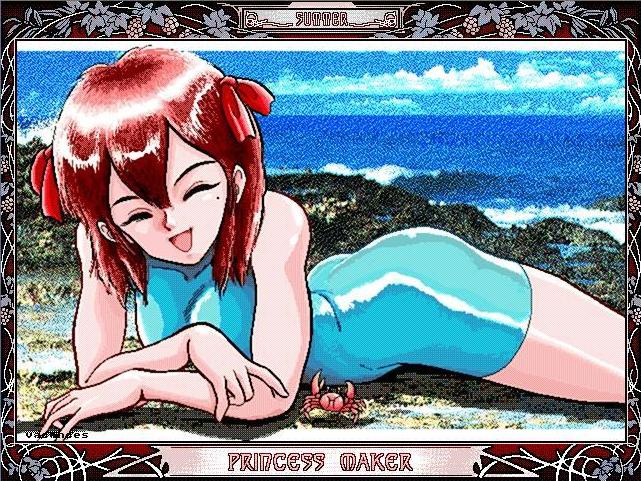YU-NO Is a Parent–Child Incest Romance
In response to a potential objection to my argument, I will clarify what I mean when I maintain that YU-NO is fundamentally a parent–child incest romance story, as opposed to a story that features this content incidentally.
As a first example, I will first consider the 1982 film Blade Runner, another acclaimed piece of media with certain questionable content. In the latter half of Blade Runner, there is a scene in which Harrison Ford’s character Deckard sexually assaults Sean Young’s character Rachael. Uncomfortable with the physical intimacy she has engaged in, Rachael attempts to leave Deckard’s apartment. With an expression of rage, Deckard physically restrains her, slams the door shut, and throws her into the blinds. Rachael looks afraid. Deckard forces a kiss on her and demands she say that she loves him. Particularly given that Deckard has the full legal right to murder Rachael, the scene is terrifying. However, romantic music plays. In the film, this moment is a consummation or initiation of the characters’ love. Blade Runner not just trivializes but romanticizes sexual assault. The perspective of someone who rejects the story over this moment is valid. However, one would be hard-pressed to argue that the sweet romance of sexual assault is an overarching theme of Blade Runner. Sexual assault does not recur. Were the scene rewritten to remove Deckard’s coercive violence, the rest of Blade Runner would remain entirely coherent. This moment is an unfortunate creative decision in one scene, not the culmination of the themes or plot. The sequel, 2049, even takes this scene as an ill omen, Deckard and Rachael’s relationship apparently not ending well.
For a second example whose relevance is more obvious, the original Princess Maker is an influential 1991 child-raising simulation from Gainax. Despite the innovation the simulation achieves, Princess Maker and at least some of its sequels pander to the pedophiliac subculture in anime and manga.

There are more highly sexualized depictions of the daughter in the original Princess Maker than the example one above, including nude, both younger and older. Displaying more graphic sexualized images of the cartoon minor here would be unnecessary to make this point. In another use, the above picture might reasonably not be considered sexualized. Given the surrounding context of the other, more overtly erotic images in the video game and of the overall PC-98 video game culture, however, it becomes something like a glamour image of the player’s underaged daughter.
Claims that the child nudity and even certain sexualized costumes the player’s daughter can wear reflect cultural differences are undermined by the existence of the ending in which the player character marries his daughter. These points all apply to multiple entries of the series. It is not a coincidence that gameplay features pioneered in the context of raising a virtual daughter would become standard aspects of dating sims such as Tokimeki Memorial (although not wholly equivalent since, in the dating sim, the player effectively raises the player character rather than playing as a character raising someone else). However, in Princess Maker, the romantic incest ending is one possibility of over seventy and not easily achieved. While worth discussing, this material is not necessarily the point of the complex stat systems of strength and magic and religious morality or even the best or most definitive ending. It is easy for a player to undertake multiple playthroughs and never encounter this ending. This and some of the iffy sexualization are optional and more in the character of an Easter egg.
In contrast, Takuya and Yu-no’s pairing is the inevitable, single outcome of YU-NO, the “love” that the title alludes to. The large narrative emphasis of the text-heavy adventure game format also lends Kanno’s story more gravity than the breezy fantasy scenarios of Princess Maker. Removing the objectionable elements from YU-NO would result in a different story with a different plot and different themes. Removing them from Princess Maker would not substantially change the video game. Princess Maker is a simulation that may incidentally feature parent–child incest as a possibility, whereas YU-NO is a parent–child incest romance by essential gameplay and writing decisions. In the context of the allegedly cerebral and moving narrative, the very title YU-NO: A Girl Who Chants Love at the Bound of This World means semi-pedophiliac incest, a Lolita but tabooer, pulp sci-fi, and written much worse by an author who considers the relationship wholesome. My arguments regarding Koudai’s role and the questionable sociopolitics may be disputed. But the Oedipal narrative pattern and what literally happens in YU-NO are beyond question.